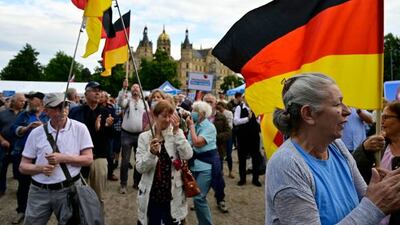A rise of political extremes fuelled by repeated crises in Europe is challenging leaders to show that "democracy works", a former German diplomat has told The National.
The far-right Alternative for Germany party (AfD) made a historic breakthrough when it won a district election on Sunday thanks to an “unfortunate intersection” of flashpoints over immigration and the Ukraine war coinciding with the vote, extremism expert Hans-Jakob Schindler said.
Germany's handling of climate change has been blamed for worsening public discontent, while the Covid-19 pandemic is credited with having boosted conspiracy theorists on the extreme right.
The far-right has entered government in Italy and Finland in recent months while fringe parties won seats in the Greek parliament in elections on Sunday.
Mr Schindler, a director at the Counter Extremism Project and former German diplomat in the Middle East, said several crises had “deeply ingrained a sense of insecurity into society”.
“There was Covid, and then when Covid was slightly more under control, the Ukraine war started,” he said.
He said the AfD, which won the local election in the central state of Thuringia at the weekend, benefited from the recent debate about a migration crackdown in Europe.
The move to turn back migrants at Europe’s borders speaks to one of the AfD’s core issues after it first surged into Germany’s parliament following the 2015 refugee crisis.
"The only way to deal with an extremist party is not necessarily to isolate them, but to concentrate on good governance, on delivering a good argument to say democracy works," Mr Schindler said.
The AfD is under surveillance by German intelligence services because of alleged extremist leanings.
Nationalist and climate-sceptic, the party also sets itself apart from the German mainstream by taking Russia-friendly positions that question Berlin’s support for Ukraine.
The AfD’s Robert Sesselmann was elected head of the Sonneberg local government district when he received 52.8 per cent of votes in a run-off with the centre-right Christian Democrats.
After a run of electoral setbacks during the pandemic, the AfD is now polling as high as 20 per cent and has overtaken Chancellor Olaf Scholz’s Social Democrats in some surveys.
"Their fortunes changed with the war in Ukraine and, because it’s one of their core issues, with the discussion about the new European migration pact. They could really ride that wave,” Mr Schindler said.
“Whenever they are able to exploit certain divisions more, they get a little bit more. And when they’re seen as actually not contributing to any solutions to any of those things, which they usually don’t, then their fortunes fall again.”
Mr Scholz’s spokesman made a plea for tolerance in the wake of the AfD’s election win, which gives the party its first foothold in power despite other parties refusing to co-operate.
“Our country is shaped by values such as tolerance, decency and respect. This character should be maintained and consistently practised,” Steffen Hebestreit said.
A report published on Tuesday found that 8,827 cases of discrimination were reported to a German government agency last year, a record high. About a third discrimination based on people's ethnic background.
The Federal Anti-Discrimination Agency said one housing association had been caught discriminating against an Arab family after it made the same application under a fake, German-sounding name.

Discrimination such as this "can have existential consequences", said Germany's anti-discrimination commissioner Ferda Ataman.
"Anyone who searches for a flat in vain because their surname sounds Arab or Turkish, or who cannot get a job because they are supposedly too old, knows this only too well."
Germany's centre-right opposition has vowed to set out a mainstream alternative by emphasising its differences with the Greens in Mr Scholz’s coalition, whose drive to phase out gas boilers has been fiercely attacked by the AfD.
The party's electoral strongholds are in the former communist East Germany but an undercurrent of far-right sympathies exists across the country.
Raids took place nationwide in December that exposed what prosecutors said was a far-right plot to overthrow Germany’s post-1945 democracy and install an authoritarian regime.
Authorities said the plot was inspired by the Reichsbuerger (Citizens of the Reich) movement which rejects the legitimacy of the post-war state and is believed to have grown in strength during the pandemic.


